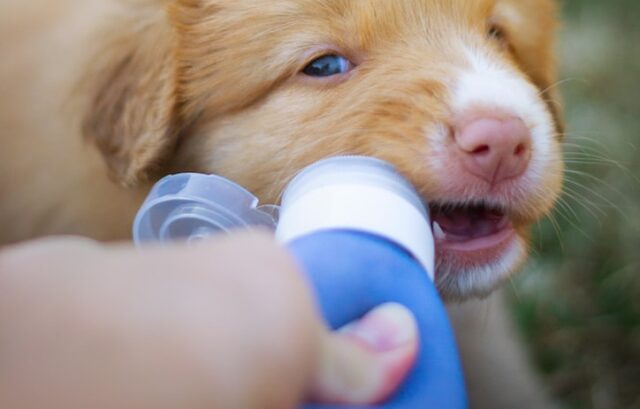Making sure our animal companions get a balanced diet is essential. Similar to people, dogs can develop allergies and yeast infections, which can be uncomfortable and have negative health effects. Finding the finest best dog food for allergies and yeast infections may significantly impact how healthy your dog is overall. In this post, we’ll look at many factors in choosing the best dog food to allay these worries and give our cherished dogs some peace.
Understanding Allergies and Yeast Infections in Dogs
Before diving into the best dog food options, it’s important to understand the nature of allergies and yeast infections in dogs. Allergies can be triggered by various factors, including certain ingredients in their food. Common symptoms include itching, skin rashes, digestive issues, and respiratory problems. On the other hand, yeast infections are often characterized by ear infections, itchy skin, and a strong odor. Identifying the specific allergens or causes of yeast infections can help in selecting the most suitable dog food.
Key Considerations for Choosing Dog Food for Allergies and Yeast Infections

-
Consulting with a Veterinarian: Before making any dietary changes, it’s essential to consult with a veterinarian who can diagnose allergies or yeast infections and provide guidance on the appropriate treatment and dietary adjustments.
-
Limited Ingredient Diets: Opting for dog food with limited ingredients can help eliminate potential allergens. Look for products with easily digestible protein sources like turkey or fish, and avoid common allergens like wheat, corn, and soy.
-
Grain-Free Options: Some dogs may have grain sensitivities that can contribute to allergies or yeast infections. Grain-free dog food options can be beneficial, replacing grains with alternative carbohydrates such as sweet potatoes or peas.
-
Novel Protein Sources: Introducing novel protein sources like venison, duck, or rabbit can be effective for dogs with allergies. These unique proteins are less likely to trigger allergic reactions.
-
Probiotics and Digestive Enzymes: Incorporating dog food that contains probiotics and digestive enzymes can support a healthy gut and aid in managing yeast infections.
-
Avoiding Artificial Additives: Dog foods with artificial colors, flavors, and preservatives can potentially worsen allergies or yeast infections. Opt for natural and wholesome ingredients.

Top Dog Foods for Allergies and Yeast Infections
Tips for Transitioning to a New Dog Food
Switching your dog’s food should be done gradually to avoid any digestive upset. Here are some tips for a smooth transition:
- Gradual Transition: Start by mixing a small amount of the new dog food with their current food. Over the course of a week, gradually increase the proportion of the new food while decreasing the old food. This will allow their digestive system to adjust smoothly.
- Monitor Their Response: Keep a close eye on your dog during the transition period. Look for any signs of discomfort or adverse reactions. If you notice any unusual symptoms, consult your veterinarian for guidance.
- Stick to the Routine: Dogs thrive on consistency, so it’s important to establish a regular feeding schedule. Feed them at the same times each day and avoid frequent changes in their diet, as this can contribute to digestive issues.
- Provide Ample Water: Ensure your dog has access to fresh water at all times, especially during the transition. Hydration is key to maintaining their overall health and aiding in digestion.

Conclusion
Choosing the best dog food for allergies and yeast infections is a crucial step in ensuring the well-being of our canine companions. By considering factors such as limited ingredients, grain-free options, novel protein sources, and the inclusion of probiotics and digestive enzymes, we can address these health concerns effectively. Remember to consult with a veterinarian for a proper diagnosis and personalized recommendations. With the right diet and care, we can help our dogs live a happier, healthier life.
FAQs
Q1: Can I treat allergies and yeast infections in dogs solely through diet?
While diet plays a significant role in managing allergies and yeast infections, it's important to consult with a veterinarian for a comprehensive treatment plan. They may recommend additional measures such as medications, topical treatments, or environmental modifications.
Q2: How long does it take to see improvements in my dog's condition after switching their food?
The timeframe for improvement can vary depending on the individual dog and the severity of their condition. In some cases, you may start noticing positive changes within a few weeks, while others may take longer. Patience is key, and consistent monitoring is essential.
Q3: Can any dog food labeled as "grain-free" be suitable for dogs with allergies or yeast infections?
Not necessarily. While grain-free options can be beneficial for some dogs, it's important to consider other ingredients as well. Always check the protein sources, avoid common allergens, and opt for high-quality, balanced diets that meet your dog's nutritional needs.
Q4: Are there any specific dog breeds more prone to allergies and yeast infections?
Certain breeds may be more susceptible to allergies and yeast infections due to genetic factors. Breeds like Bulldogs, Retrievers, and Terriers are known to have a higher incidence of allergies. However, it's important to note that these conditions can affect dogs of any breed or mix.
Q5: Can I prepare homemade dog food to address allergies and yeast infections?
Preparing homemade dog food can be an option, but it's essential to ensure a balanced and complete diet. Consulting with a veterinary nutritionist is recommended to formulate a recipe that meets your dog's specific dietary needs and addresses allergies or yeast infections effectively.
Read also
- Unraveling the Mystery: All About the Scooby Doo Dog Breed
- Dog Chewing Nails: Causes, Prevention, and Effective Solutions
- Best Dog Food for Seniors
- Best Dog Food for Goldendoodles: Your Guide to Optimal Nutrition
- Unveiling the Unconventional: Ugliest Dog Breed
- Discover the Enchanting Feist Dog Breed: A Blend of Tenacity and Intelligence
- Dog Muzzle for Barking: Control Excessive Noise with Effective Muzzles
- Discover the Best Dog Food for Yorkies – A Complete Guide
- Puppy Barking: Understanding and Managing Your Furry Friend’s Vocalizations
- Do Dog Dental Chews Work? We Investigate and Reveal the Truth
- Vet Approved Homemade Dog Food Recipes for Kidney Disease
- Unveiling the Fascinating World of Griffon Dog Breed | A Complete Guide
- Best Dog Food for French Bulldogs: Secrets Revealed
- Top 10 Best Dog Raincoats | Keep Your Furry Friend Dry in Style
- Dog Allergies: Understanding the Causes and Solutions
- Dog Food Storage Container 40 lbs: Keeping Your Pet’s Nutrition Fresh and Secure
- Nutritional Yeast for Dogs: A Comprehensive Guide
- Super Chewer Dog Toys: The Ultimate Guide for Aggressive Chewers
- Discover the Most Loyal Dog Breed: Unwavering Canine Companions
- Puppy Barking at Night: A Complete Guide to Understanding and Addressing the Issue





